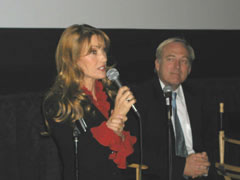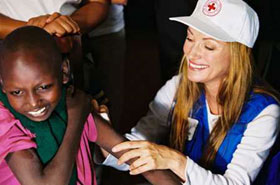| ‘Disease of the Wind’ documentary chronicling the Kenya Measles Initiative campaign wins big at the Dallas film festival |
Through a seven day humanitarian journey to Kenya with the American Red Cross, viewers got a glimpse of the tragedy, and also the hope, of a nation riddled with a deadly disease through the eyes of Jane Seymour and the students. Seymour and the students learned first-hand how measles kills a half million children each year in Africa but also learn that with enough hope, care and support, precious lives can and are being saved. “We were only able to go into some of these places because we were with the Red Cross and they were trusted. The people knew we were there to do something good,” said Jane Seymour. “We didn’t consider the trip a hardship - we couldn’t - as our hardships didn’t even compare to what the kids living there face.”The film was written and directed by James Keach, produced by Nicolas Hippisley-Coxe and presented by Jane Seymour, a National Celebrity Cabinet member for the American Red Cross. Keach, Seymour, Hippisley-Coxe and other key members of the film crew attended the festival. “This film was about these larger agencies work - and how you can not be apathetic. At first, it seemed so insurmountable. But then we saw how that one dollar made a difference. If people started by wiping out measles, that’s something you can do - the American kids we took will spread that word, that they deserve a life like we have,” said Keach. “In the beginning, I could hear the kids speaking through society’s or their parents eyes - but at the end, they were speaking from their own hearts.”
During a question and answer session following the film, an audience member stated “Most of us will never go to a third world country. To put this story in a film through the eyes of children allows us to have an emotional connection with something that is difficult to see. This is the closest most of us will get.” “It was such an unbelievable experience for me as a person,” said Roland ‘Ozzie’ Smith, Director of Photography for the film. “Some of those kids touched me - I remember yelling at my son who was assisting me, saying ‘we’re out of focus!’ and then I realized the lens was blurry because I was crying. I hugged my son every night - this trip changed a lot of the ways I think, believe me.” Keach explained “The only way you can vaccinate 14 million children in one week is through the Red Cross. The mobilization was amazing - the way they use volunteers to go house to house to talk with mothers. I was really affected - probably more than anyone. I was amazed to see how this could be done.” By the end of the week, 13, 302, 991, or 97.9% of Kenyan children received vaccinations, saving 18,000 lives and taking an important step in combating the spread of infectious disease in an increasingly small world. As the young Masai poet says at the film's end, "Perhaps if we shed these words of age, color, tongue or creed; the pleas and the cries of the African child, the world will consider and heed." “We made a difference making this film - maybe it will help save a life,” said Keach. “Before with other films, maybe I made someone laugh or I scared someone - but maybe this time I saved this little guy’s life.” Keach ended the question and answer session on closing night with his overall mission in making this film, “The message is this - get involved and give to people who have less than you.”
A mom: “I think every teenager should see this - we are so fortunate that we have all we do” David Rudduck, Deep Ellum film festival volunteer and Red Cross volunteer: “This is the only documentary we had this year that really focused on a problem we can solve.” A teacher: “How do I show my students? I really want to show it at my school” Audience member: “How can I help? Can we give a donation to the Red Cross?” Hank Bashore, Dallas Area Red Cross board member: “People need to know about this program. It should be shared with kids, adults, all Red Cross board members should really see this.” Jim and Elaine Holloway, audience members: “I didn’t expect to find the joy in the African kids. This film proves that economics don’t breed happiness. It was also wonderful to see how the American kids’ lives changed.” “I remember having measles as a kid - that was the sickest I ever was. It was eye opening to see that it is a predominant disease in Africa and it’s so easy to stop. “ “For the Red Cross to be doing this, and it costs less than a dollar to vaccinate a kid - that’s amazing.” For more information on the Measles Initiative, please visit www.measlesinitiative.org.
|

